
Etruscan_Phrases
Translation of the Magliano Lead Disk, Script "M"
by
Mel Copeland
(from a work published in 1981)
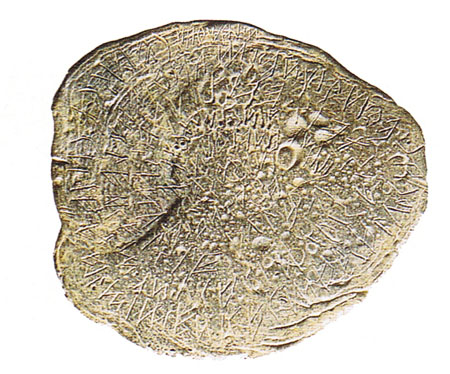
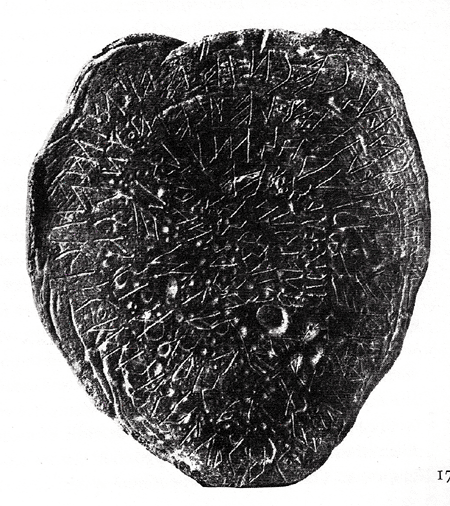
About the Translation![]()
This page is being updated to reflect changes to other works. It's current version is available as a PDF file: "Work Notes on the Magliano Disk Rev. 1. Related documents are the Zagreb Mummy (see "Work Notes on the Zagreb Mummy." ), Tavola Cortonensis (see "Work Notes on the Tavola Cortonensis" ) and Perugia Cippus scripts ( "Work Notes on the Perugia Cippus."). The following text will be updated as appropriate.
The words of this text are selected from the Etruscan_Phrases_a.html, Indo-European Table 1.
This script is perhaps the oldest script, dating circa. 600 B.C. It was written in a spiral, much like the Phaistos Disk. I have transformed the script into the linear format of other Etruscan texts. A translation follows, the details of which are below. This translation follows the results of the Zagreb Mummy, Tavola Cortonensis, Cippus Perusinus and Perugia Cippus scripts, all of which are reconciled to one another. This latest change is based upon reconciliation of the text with a glossary (Excel version is the latest) developed from Indo-European Table 1. We have added color images of the disk (Image source: "The Etruscans," by Federica Borrelli and Maria Cristina Targia, The J. Paul Getty Museum, Los Angeles, 2004) which have contributed to a clearer view of the script. Changes to the script will follow.
![]() M1 M to
lead to the hill, highground to us of
Gnaeus I possess myself; I led
M1 M to
lead to the hill, highground to us of
Gnaeus I possess myself; I led
M8 I make blind/uncertain
Marcus; I atoned for/expiated the
blind daily, for a long time (L. diu) of the goddess
Dione itself
M13 to the goddess Menerva
who of her you wage war I give, present houses
M19 to the north of them the god you shunned; you
plead to the power there;
M24 I am gentle; to him he drove the god Tin there the
reigns of the chariot; greedy
M32 you arose; your reigns to the I have trusted in
M38 the rough sharp rock
often, so many times possesses 130 knights I reap
M45 myself of the house of
the goddess Dia Leth (name?) I allure Bacchas, Euans
of the the aliens
M50 I control his (It. suo,
sua) queen supposing that she grows strong of you,
yours the bronze, copper of the age
M60 in the horses, army you
take/bring (It. menare) of me I rejoice to us of the
Marsi the whole
M67 Cimthum (place?) whereby
the goddess Dia Leth (name?) to be situated to the
seas (L. mare-is) the war (L. bellum-i) I bear (L.
enitor, niti, nisus, or nixus) there
M74 the covetus/greedy
because (L. quia) I rejoice (L. laetor-ari) of Cimtem
(place name?) I possessed/dwelled whose (It. chi) mare
(L. equa-ae) they separate (L. sepo-are) so many times
(L. toties -iens)
M78 you whom I gather, assemble to destroy the people
of Henna to nothing I came and derived, drew love (end
of script)
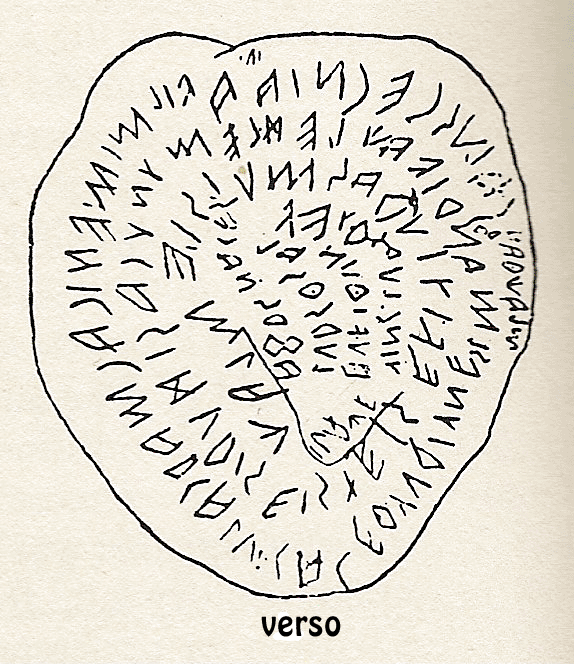
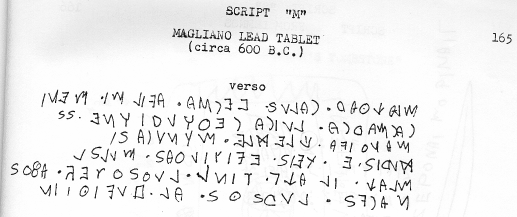
M1
M LAKTHAR CFLVSCE CNIA
AFIL MI
MENI [Translation:
M to allure (L. lacto-are) of the hill, high ground
(L. collis-is) to us (It. ce) of Gnaeus, (L. Gnaeus-i,
a Roman Praenomen, shortened Cn.) I inhabit, hold (L.
habeo-ere-ui-itum); myself (It. mi) I led (It. menare;
Fr. mener)] Note: the suffix "IA" is the genetive
case. We believed that M-3, CFLVS was Calus, but
further examination of the Getty Museum image suggests
an "F" which would agree with the context of the
passage. The "F" at AFIL, M-6, shows a similar
rendering of the "F." LAKTHAR conjugates as LAKTH at
Z516.
M8
CAC MARCALVI CACE THYV DIVNE
SeSe [Translation: I
make blind/uncertain (L. caeco-are) Marcus (L.
Marcus-i, a Roman praenomen) or alternatively, the
mark (It. marca, f.); I atoned for/expiated
(L. luo, luere, lui, luiturus) the blind (L.
caecus-a-um) daily, for a long time (L. diu) of the
goddess Dione (L. Dione-es and Diona-ae, the goddess
Venus or mother of Venus) itself (L. sese)]
M13
MANRIFAKi LE BeLE MYNV CASI [Translation: to the
goddess Menerva who (L. qui; It. chi) of her (It. le)
you wage war (L.bello-ari) I give, present (L.
munero-are) or alternatively, the office/public
building (L. munus [moenus]-eris) houses (L. casa-ae)]
M19
BVRISEIS
TEIS
EFITI VRAS
MVLvS Le; Translation: [to the
north (L. m. Boreas-ae) of them (L. eis, gen. &
dat. they; It. essi, esse, them) the god (L. deus,
divus; Fr. desse,f. goddess) you shunned (L.
evito-are) you plead (L. oro-are) to the mass of
men/power (L. f. moles-is) there]
M24
MvLAKIL AKaPa TIN Le
LVRS RvTEF
A8aRaS
[Translation: I am soft/gentle (L. mollesco-ere, to
become soft or gentle) to him (It. egli; Fr. il) he
set in motion/drove (L. ago, agere, egi, actum) of the
god Tin there the reigns (L. lorum-i) of the chariot
(L. f. rota-ae); covetus/greedy (L. avaras-a-um)]
M32
NACFSLVRS
THe SAL
HV FITHI IN
[Translation: [you arose (L. nascor-i; It. nascere,
nasceste); the reigns (L. lorum-i) thy/thine (L.
tuus-a-um); to the (It. al) I have (L. habeo-ere) I
trusted (L. fido, fidere, fissus sum)] in (L. in)]
(end of verso)
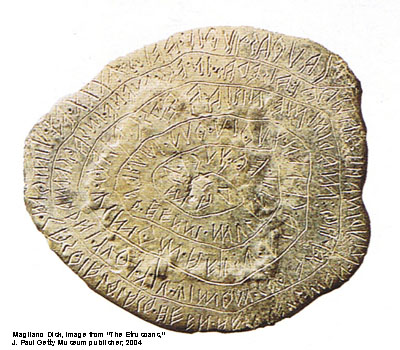
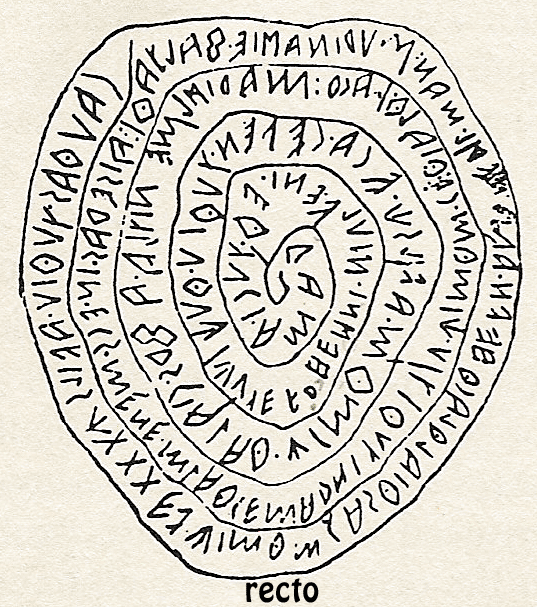
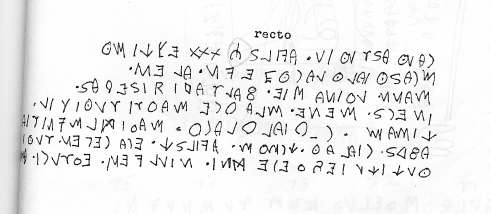
M38
CAVTHAS TVTHIVAFILiS CXXX EYKI MeTH 1)
[Translation: the rough sharp rock (L. cautes-is) so
many times (L. toties -iens) inhabits, possesses 130
knights (L. eques-itis) I reap/move (L. meto, metere,
messui, messum)]
M45
Me CASa THIA LeTH LACTH HEFNALENI
[Translation:
myself (L. me; It. me) of the house (L. f. casa-ae)
the goddess Dia Leth (name?) (L. Dia-ae, f. mother of
Mercury) I allure (L. lacto-are) Bacchas, Euans of the
aliens (L. alienus)]
M50
MAN SV RINA SI E8ALTA THI:
AIS ERASTranslation: [ I
control (L. maneo, manere, mansi, mansum) his (It.
suo, sua) queen (L. regina ; It. reginna, f.; Fr.
reine, f.) supposing that (L. si) she grows strong (L.
evalesco-vescere-valui) you, yours (L. ti) the bronze,
copper (L. aes, aeris) of the age (It. era, f., Fr.
era, f.]
M60
INECS
MENE
Me LATH CE MARSI TVTHI TIV
[Translation: on (L. in) the
horses, army (L. equus-i [older form equos &
ecus]) you take/bring (It. menare) of me (L. me) I
rejoice (L. laetor-ari) to us (It. ce) of the Marsi
(L. Marsi-orum, an ancient people of Latium;
alternative, Mars, L. Martius, adj. of Mars) the
complete/whole (L. toti) of the divine (L. dius-a-um,
m. god, divus-a-um, m.; It. m. dio; Fr. m. dieu)]
M67
CIMTHuM CA:
THIA LeTH
IACeR
MARI BeLeM
ENIT LA
[Translation:
Cimthum (place?) where, which, whereby (L. qua) the
goddess Dia Leth (name?) (L. Dia-ae, f. mother of
Mercury) to be situated (L. iacio, iacere, iacui, to
lie, be situated, be flat, lie sick or overthrown or
killed) to the seas (L. mare-is) the war (L. bellum-i)
I bear (L. enitor, niti, nisus, or nixus) there (Fr.
la)]
M74
A8aRaSCIA LATH CIMTHuM
AFILS Ki
ECA CEPEN
TVTHIV [Translation: [the
covetus/greedy (L. avaras-a-um) because (L. quia) I
rejoice (L. laetor-ari) of the Cimthum (place name?) I
possessed/dwelled (L. habeo-ere-ui-itum, to possess;
habito-are) whose (It. chi) mare (L. equa-ae) they
separate (L. sepo-are) so many times (L. toties
-iens)] Note: CEPEN is a frequently used word in the
Zagreb Mummy Script. AFIL, AFILS, is a word used in
several scripts denoting years one dwelled/lived.
M78
THV KI KV TEVR HENNINIVL FENI
ETH
TVCI
AMAR;
Translation: [you (tu) whom (L, quae) I assemble (L.
coeo-ire) to destroy (L. deuro-urere-ussi-ustum)
Hennae (L. Henna-ae, city of Sicily with temple of
Ceres) to not, nothing (L. nihil, nil) you / I came
(L. venio, venita, veni, ventum) and (L. et) I touched
/ derived (It. toccare, to touch, concerned; alt. L.
duco, ducere, duxi, ductum, to draw, construct, charm,
derive, draw in, lead, marry, command) love/fondness
(L. m. amor-oris)]
End
of Script
Notes;
1)
Transliteration of script (images, recto and verso)
from "Voices in Stone," Ernst Doblhofer, 1961, The
Viking Press, 1961, p. 298.
2) The Etruscans used
"Roman numerals" (actually, they gave the Romans our
alphabet and Roman numeerals) and the character
preceeding "XXX" appears to be the CH![]() written upsidedown. This character
evolved into the "C." In Roman numerals the "C"
represented 100, and "X" represented 10.
written upsidedown. This character
evolved into the "C." In Roman numerals the "C"
represented 100, and "X" represented 10.
![]()
![]() Return me to
Return me to ![]() Home
Home
Launched 12.23.01
Updated: 12.25.01; 1021.02; 10.12.03;
5.29.05; 9.04.05; 3.24.06; 6.16.06; 12.01.06;
02.02.12; 1.21.13
Copyright © 1981-2013 Maravot. All
rights reserved.
Copyright © 1981-2013
Mel Copeland. All rights reserved.